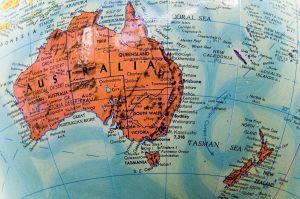


Australia Day - 26/1/2014
Australia celebrations reflect the diverse society and landscape of the nation, and are marked by community and family events, reflections on Australian history, official community awards, and citizenship ceremonies welcoming new immigrants into the country. We Christian gather to give thanks to God and ask God to bless our land. The naming of Australia has evolved over time and it bears the Jewish and the Roman and the Christianity traditions. The name "Australia" is derived from the Latin terra australis incognita that means "unknown land of the south" dated back to Roman times. Ancient Greeks used the word Australis to mean south or southern part of the world and geographer used this term until 1400 referred the region as unknown or un-named Southern Land. In 1605 a Spaniard Pedro Fernandez de Quiros sails from South America in search of the great south land he named the whole region of the south as Austrialia de Espirito Sancto it means Austria of the south of the Holy Spirit. De Espirito Sancto paid tribute to the Holy Spirit for guiding and protecting the voyage. Austrialia was an invented hybrid word combining the names Austria and Australis as a compliment to king Philip III of Spain who was a member of the house of habsburg- Austria. The name Australasia is still used today to designate Australia together with surrounding larger and smaller islands including New Zealand and New Guinea. The explorer Major Mitchell also referred to the region of western Victoria through which he travelled as Australia Felix (happy Australia).
In 1625 Hakluyt used the word Australia in English for the first time in his book Posthumus published by Samuel Purchas.
1638 a Dutch East India commercial Company officials used the word Australische.
1693 Jacques Sadeur wrote Les Aventures and Découverte translated the work and used the term Australia.
1793, George Shaw and James Smith published Zoology and Botany wrote of "the vast island, or rather continent, of Australia, Australasia or New Holland." Why Australia?
Flinders was the first recorded person who circumnavigated Australia. He named the land Australia in a chart compiled in 1804 whilst he was held prisoner by the French in Mauritius. When he returned to England and published his works in 1814 he was forced to change the name to Terra Australis by the British Admiralty. Governor Macquarie of New South Wales became aware of Flinders' preference for the name Australia and used it in his dispatches to England.
In 1824 the British Admiralty finally accepted that the continent should be known officially as Australia.
1901 The British Colony formed a Federation to mark the birth of modern Australia but until 1935 all Australian states and territories adopted use of the term "Australia Day".
1994 the date became a public holiday for all states and territories.
So who gave Australia its name? If you want a simple answer we would have to say Matthew Flinders. He was the first dealing with an island continent, referred to it as Australia and his naming recommendation was eventually accepted by the British authorities. However if we found ourselves elsewhere in Spain or Holland, surrounded by the Dutch and Spanish sailors we might hear the alternative views. Whatever the argument is we can't deny the reality at the time that the land was consecrated to the Holy Spirit and it bears the mark of Christian explorers.
Vudinh Tuong
In 1625 Hakluyt used the word Australia in English for the first time in his book Posthumus published by Samuel Purchas.
1638 a Dutch East India commercial Company officials used the word Australische.
1693 Jacques Sadeur wrote Les Aventures and Découverte translated the work and used the term Australia.
1793, George Shaw and James Smith published Zoology and Botany wrote of "the vast island, or rather continent, of Australia, Australasia or New Holland." Why Australia?
Flinders was the first recorded person who circumnavigated Australia. He named the land Australia in a chart compiled in 1804 whilst he was held prisoner by the French in Mauritius. When he returned to England and published his works in 1814 he was forced to change the name to Terra Australis by the British Admiralty. Governor Macquarie of New South Wales became aware of Flinders' preference for the name Australia and used it in his dispatches to England.
In 1824 the British Admiralty finally accepted that the continent should be known officially as Australia.
1901 The British Colony formed a Federation to mark the birth of modern Australia but until 1935 all Australian states and territories adopted use of the term "Australia Day".
1994 the date became a public holiday for all states and territories.
So who gave Australia its name? If you want a simple answer we would have to say Matthew Flinders. He was the first dealing with an island continent, referred to it as Australia and his naming recommendation was eventually accepted by the British authorities. However if we found ourselves elsewhere in Spain or Holland, surrounded by the Dutch and Spanish sailors we might hear the alternative views. Whatever the argument is we can't deny the reality at the time that the land was consecrated to the Holy Spirit and it bears the mark of Christian explorers.
Vudinh Tuong


Written by Fr Vũđình Tường
St Francis Xavier Catholic Parish
Roman Catholic Archdiocese of Brisbane Australia
St Francis Xavier Catholic Parish
Roman Catholic Archdiocese of Brisbane Australia


